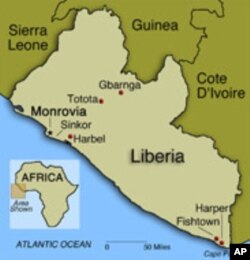In Liberia, the publisher of the FrontPage Africa online magazine and newspaper goes before the Supreme Court Wednesday to answer why he published a letter to the editor in which the author accused an associate justice of the court of bias in a murder case before the court.
“A couple of years ago, there was a murder case here when a little girl was killed. Allegedly, she was raped by her guardian, and the case was a big case in Liberia. So, the letter published to the editor [by one Garsuah Gborvlehn] mentioned that one of the family members complained that one of the associate justices, Gladys Johnson, did not allow the family to go to court and they were pushed away. The Chief Justice and the Supreme Court are concerned that the publication of the letter may influence the case,” publisher Rodney Sieh said.
Sieh says he and his lawyers are contemplating asking Chief Justice Johnnie Lewis to recuse himself because FrontPage Africa had written stories in the past which the Chief Justice did not like.
In a letter to FrontPage Africa readers, Sieh explained that he had a “bad day” at the Supreme Court on Monday (November 1), the day he was first summoned to appear.
In the letter, Sieh told Chief Justice Johnnie Lewis to “come and get me” because he said the chief justice and three other associate justices denied him the right to explain the basis for publishing the letter to the editor.
“During Monday’s proceedings, it was very ugly. The letter that they summoned me with, I was told, was to go there and explain the basis for publishing the letter in my paper. But, when I got there what I got instead was [an] interrogation. All the four justices were all interrogating me as if I was some kind of criminal,” he said.
Sieh said the justices ridiculed him by asking him questions whether or not he was a member of the Press Union of Liberia and if he could quote Article 8 of the Press Union of Liberia Code of Ethics.
“And, they were all going back and forth about all kinds of things that I got to a point where I said, ‘You called me here to explain something, but you won’t give me the chance to explain myself, it’s not fair.’ I said, ‘Mr. Chief Justice, you’re behaving in a dictatorial manner.’ And, that got their attention and got them angry, and they threatened to discipline me. And, that’s how the whole session ended. It was very ugly,” he said.
Sieh said the right of readers to submit letters to the editor is protected under Article 15 of Liberia’s constitution which he said guarantees freedom of expression.
“In fact, in today’s edition of our paper, we managed to obtain a 1979 letter written in the government-owned newspaper at the time, The Liberian Age, in which the associate justice [of the Supreme Court] now, Gladys Johnson, who’s the subject of this controversy, wrote a letter in that paper condemning the African Union leaders calling them corrupt and involved in nepotism and all kinds of things,” he said.
Sieh said he decided to publish the 1979 letter to the editor by current associate justice Johnson to show that, while she was allowed to freely express her views as a young person, she is not willing to grant the same privilege to others.
He said he has received support from the president of the Press Union of Liberia, Peter Quaqua, who he said accompanied him to the Supreme Court and will likely be there by his side Wednesday when he goes back to the Supreme Court.









